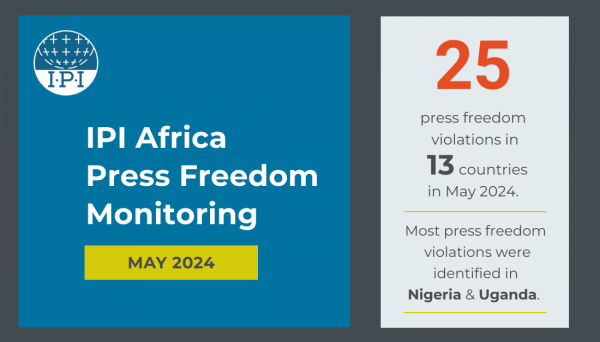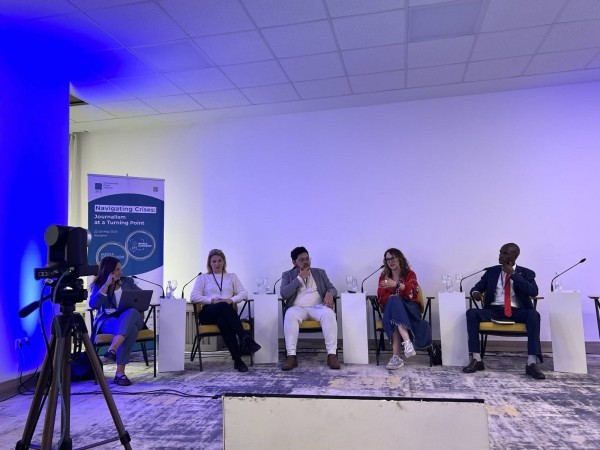Violent conflicts in Mali and the Central African Republic have gravely affected the state of press freedom in these countries, but journalists in other African countries have also been subjected to recent attacks.
Mali: A war on terror, a war on journalists
While Mali’s general security situation might have improved to some degree after the French-led military intervention to drive Islamist forces out of Mali’s north, the state of press freedom and the security of journalists remain of serious concern.
Already in July of last year – after the coup d’état by Mali’s military under the leadership of Amadou Haya Sanogo, marking the beginning of the large-scale conflict in Mali’s north – IPI reported on press freedom violations including physical attacks on journalists of local newspapers such as the L’Independant.
But even though large scale combat operations have stopped, Mali’s journalistic community remains endangered.
On March 6 of this year, the Malian Le Républicain released a statement saying that their editor-in-chief, Boukary Daou, had been arrested by Malian security forces.
The cause for the arrest was the paper’s publication of an open letter, written by a Malian army captain, which called on fellow soldiers to stop working unless coup leader Sanago’s $8,000 monthly salary was not reduced.
The local news website KOACI.COM reported that Daou was not only held arbitrarily at the State Security headquarters for eight days before being transferred to a prison, but that he was beaten in an attempt to force him to reveal his sources.
Daou has been released from custody, but faces trial on April 16 on charges of “inciting disobedience” and “publishing false news”, reports say.
But Mali is not the only country in Africa in which journalists who fail to align themselves with the changing political leadership are in trouble.
The Central African Republic: After the coup, journalists are fair game
The recent ousting of former Central African President Francois Bozize by rebel leader Michel Djotodia precipitated attacks against several Central African news organisations, which were reportedly by rebel forces.
Since March the Bangui-based radio station Radio Ndeke Luka was not only the victim of verbal threats and physical intimidation, but was also looted by rebel soldiers between March 24 and March 25. Radio Director Sylvie Panika told Fondation Hirondelle, the Swiss non-governmental organization that manages Radio Ndeke, that some of the station’s vehicles, computers and other radio equipment were missing after rebel soldiers forced their way into the radio’s premises.
Rebels also ransacked the Bangui offices of Le Confidant, a privately-owned daily, removing equipment and leaving the office unusable, according to the Congo-based Journalists en Danger. The newspaper’s editor, Momet Mathurin, went into hiding out of personal security considerations, reports say.
Togo: Investigative journalism – a dangerous business
On Wednesday, April 3, a Togolese freelance reporter was beaten up in a hit-and-run attack.
As the news channel Togo Vision explained, Koffi Djidonou Frédéric Attipou, a member of the “Observers”, a contribution network for the French government-backed broadcaster France 24, and a freelance reporter for the weekly Le Canard Indépendant, was hospitalised after several men attacked him.
While there is no concrete evidence of direct government involvement in this attack, reports suggested that Attipou’s coverage of police violence and the fact he had previously been subjected to police violence raised important questions.
Togo’s continued animosity towards journalists became apparent when, on March 14, media workers protesting a new law granting excessive powers to the national media regulatory body were fired at with tear gas canisters, according to the Media Foundation for West Africa (MFWA), which reported that one journalist suffered a fractured jaw and other injuries.
Uganda: As prisoners flee, warders attack journalists covering the scene
Two journalists who were covering a prison break in the Rakai district on March 18, 2013, were assaulted by warders, according to the Human Rights Network for Journalists – Uganda (HRNJ).
Pascal Lutabi, of WBS TV and the Daily Monitor, and John Bosco Mulyowa, who works for Bukkede media, were attacked and later detained by police for an hour, HRNJ said. Lutabi told the NGO that as he was interviewing residents near the prison, prison warders began beating him with the butt of a gun and with a stick, and destroyed his video camera; he was later charged with assault.
Mulyowa told HRNJ-Uganda that a warder who saw him filming near Kalisizo prison began throwing rocks and chased him. He was reportedly detained after he went to the Rakai police station to check on Lutabi, but was released with his colleague later on.
Tanzania: Poster child gone wrong?
Tanzania was long considered a relative bastion of press freedom in the region, but recent violence has damaged the country’s track record.
On March 5, Chairman of Tanzania Editors Forum (TEF) and Managing Editor of New Habari (2006) Corporation Absalom Kibanda, was attacked in front of his house, reports said. The unidentified assailants inflicted serious bodily harm, damaging his eye, pulling out several teeth and chopping off a finger, reports said.
Kibanda had been reporting about government corruption cases only days prior to the attack.
The killing of another Tanzanian journalist in January of this year is equally disturbing. Issa Ngumba, a reporter working for a community radio station in western Tanzania, Radio Kwizera, was found dead, strangled and with a gunshot wound to his arm, several days after he had gone missing on Jan. 5, 2013.
As the Dar es Salaam-based The Citizen reports, Ngumba had uncovered mistreatment of workers by private business owners prior to his death.


